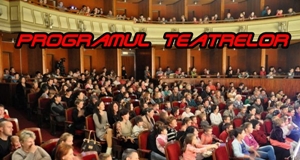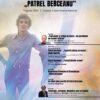Part I
Oficial Media: Since when have you been in Targoviste?
Di Trevis: Since August the 4th, so that’s two months.
OM: But you have been here before, am I right?
DT: I came in the spring, in May, to do some casting and some work on the texts and preparation. Mircea and Ranin came to London in the spring, in March, and we went to Stratford and I showed them the theatre and I introduced them to the dramaturgy and all that kind of things. And I was, of course, in Targoviste last year.
OM: What kind of collaboration did you have with other countries? And here we would like to know about your work experience in terms of religions, cultures, rituals of different countries.
DT: I have worked intensely, of course, in England and America. In America I have worked on the East Coast, on the West Coast and also in the major drama schools in America: two very famous drama schools. I have worked in France, Germany, Austria, Romania, Australia, Cuba, in the Middle East in Palestine, in the West Bank Palestine and I think that’s it.
OM: Do you feel the difference when you are here or when you are in any other country, let’s say Palestine or America?
DT: To an extent yes, but really, once you are inside the theatre is the same world of the theatre that you are in always. When I was working in Vienna once I said to the stage manager: “You know, we speak the same language, because we speak theatre”, so the main thing that you want to find when you go to a foreign country to the theatre are people with the same esthetic that you’ve got. Which is obviously related to the culture, but it’s also related to something that’s very difficult to define like what you personally find to be beautiful or what you find true or moving. You can find that in a little, tiny theatre in Palestine where people are struggling just to stay alive and you can find that in a gloriously world in an American University with thousands of pounds to spend. In the end it is down to the esthetic and your ability to make your work. Usually, when I go to places people are very hopeful about making my work.
OM: You told in the morning, at the press conference, that this show emphasizes the importance of the text. How did you manage to work with the actors, to do the verse and also being faithful to the text.
DT: I insist on the actors making the text truthful. Also, when you are dealing with Shakespeare it is not ordinary language, it is not language like “Would you like a cup of coffee? Yeah, you look nice; Oh, those boots are fabulous”- it is not everyday language. It is heightened language and so the skill is to deliver heightened language written in verse and to make it seem very truthful. Because Jean-Paul Sartre said that the theatre is consent not so much with reality, as with truth. And this is a really wonderful thing to say.
OM: If the text loses the truth, can we find it in the body language or the face mimics?
DT: No, you can’t catch it from anywhere. They have to make sense of the verse. You see, we live in a society now which is based on the one minute sound bite. Politicians give a one minute sound bite. We are sound bite generation. And it is a generation that has a disposition to sensation, rather than sense. And in every area of the arts there has been a move towards sensation rather than sense: in modern art, in modern music, in politics. The misuse of language is really horrible. For example, you have American politicians saying things like: “We’re going to get those guys”. There are many skills involved, but the actor has to have emotional truth, speak the verse which no writing is better at expressing the truth and complexity than Shakespeare’s writing. There are other writers who express marvelous truth. Through the resonance of the word both the actor enlarges his experience, but the listener enlarges his experience, too.
OM: So, you are an expert in communication.
Yes, I would say that that’s one of my great passions. And it is lack of communication between human beings that really is at the base of all the evil in the world.
When you are an expert in communication you know how to use the sound, the colors, the text in such a way that the message is not only delivered, but it goes straight to the heart of the listener.
Yes. I don’t believe in spelling things out for an audience. I expect the audience to have a response as intelligent and sensitive as me, because they can.
OM: Is there possible to find in your show a different interpretation of a message for the audience that is not so well informed?
DT: Yes. It reminds me of a friend of mine, she was a writer at a newspaper which dealt with people’s problems. And some very ordinary working class young woman wrote from a block of flats in London “I married somebody older than myself and now I’m in agony, because I have fallen in love with his son” and she said I could write one word “Fedra”. Because what the drama often involves is an emotional experience that anyone can undergo. Everybody can understand the fear of death, everybody can understand envy, ambition. Everybody can understand wanting to own other people, all these emotions are communicable to people and if they experience them in the theatre then they feel that they are a part of a human story, they’re not outside it. That somebody like Shakespeare is saying and has said for over 450 years “I know what it feels like”. For instance, if I’m dealing with Richard III, the first thing I say to the actor is “What do you think it was like to be Richard III as a little boy? How did he get any pride or strength? It was from being a soldier, from fighting. And then suddenly, when we meet Richard, his brother has defeated the enemy and now is a time of peace and for Richard that is a terrible time, the time of peace, because he has no place in society, he talks about the fact that he can’t dance, women don’t look at him, dogs bark at him in the street. So, one begins to try and discover why somebody who is crippled physically can become crippled emotionally.
In the Spanish Civil War there was a general called Astray, who was disabled and his slogan was “Long live death!” and he said about the republicans he was fighting “If they die and buried, we would take them up and kill them again!” And Unamuno, a Spanish philosopher, said “That slogan is as crippled as you are!”
Cristi Iordache & Oana Maria Grigore
Translate: Roxana Iordache
























